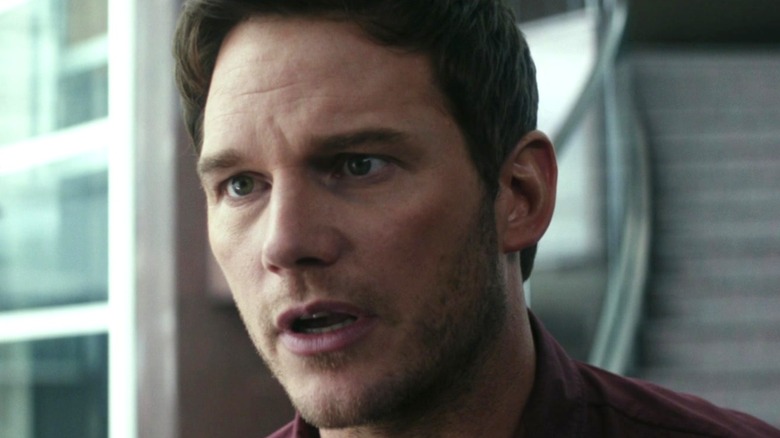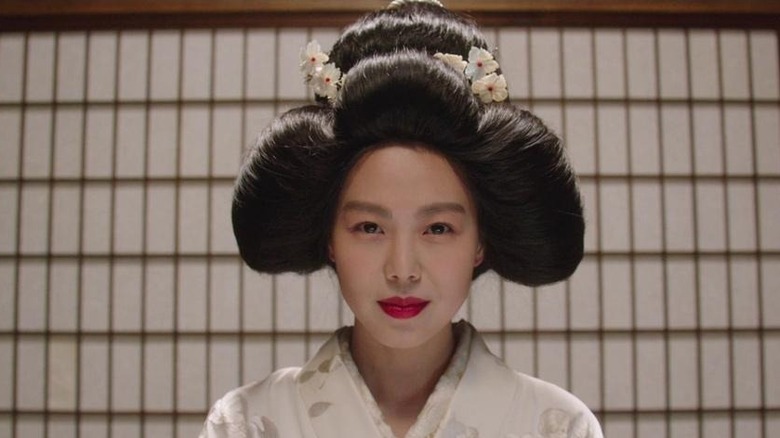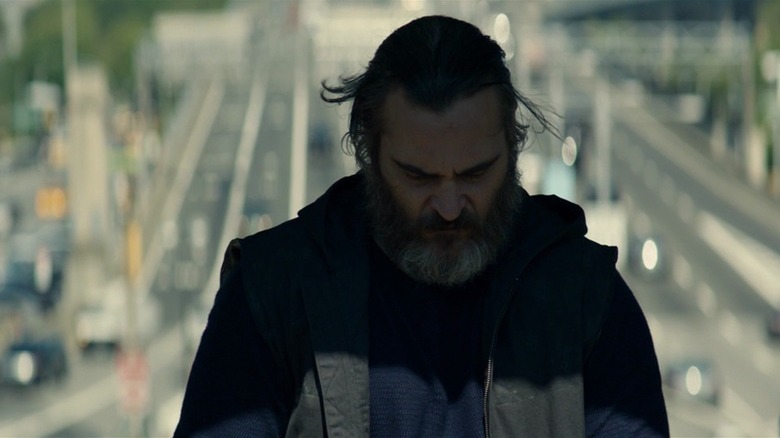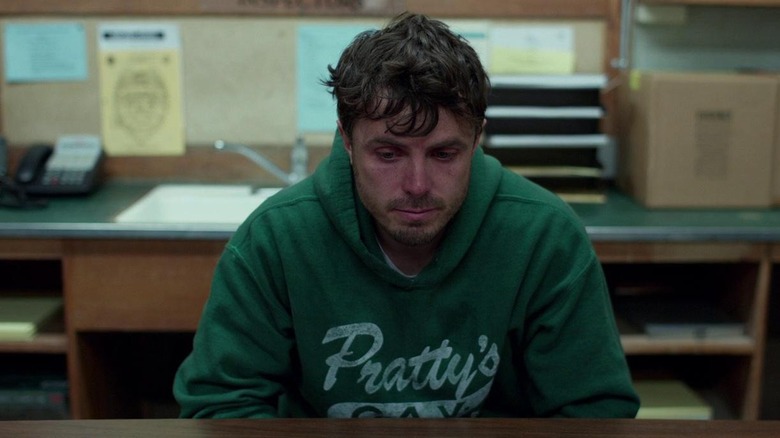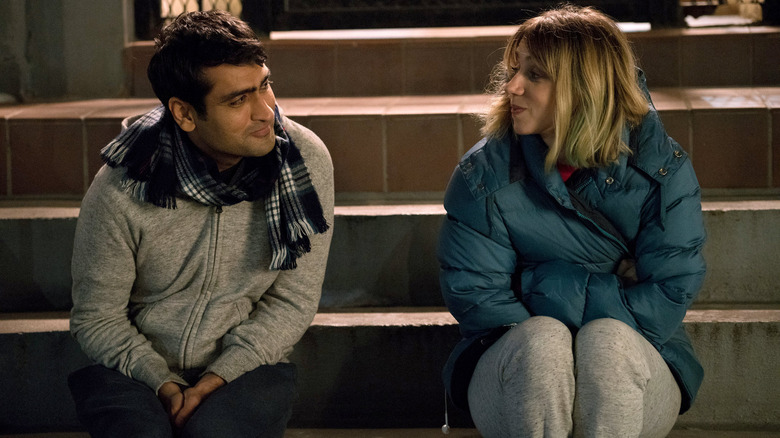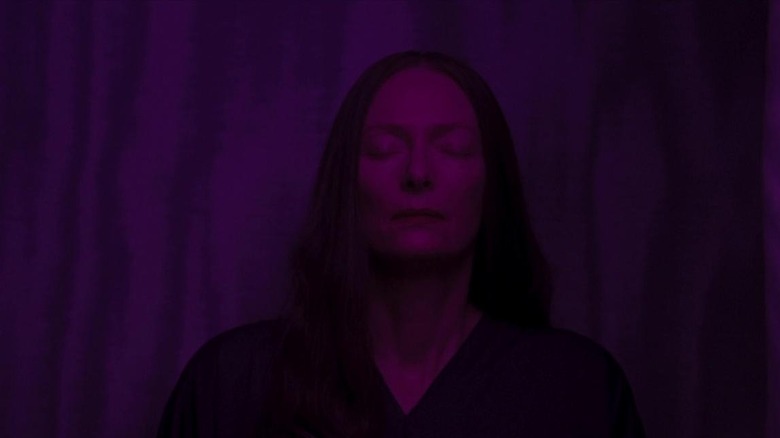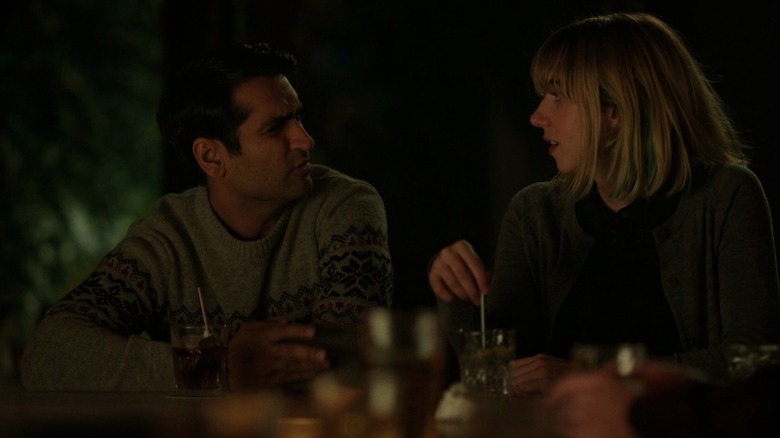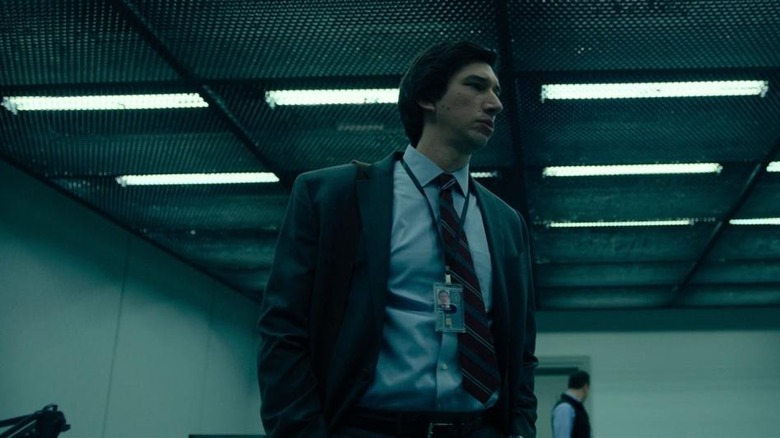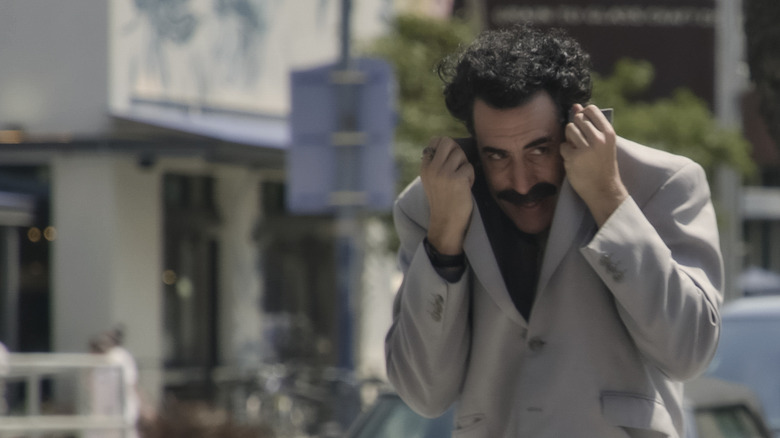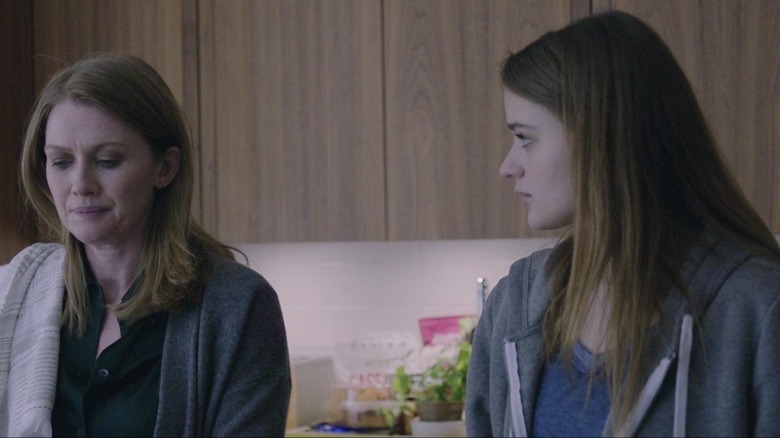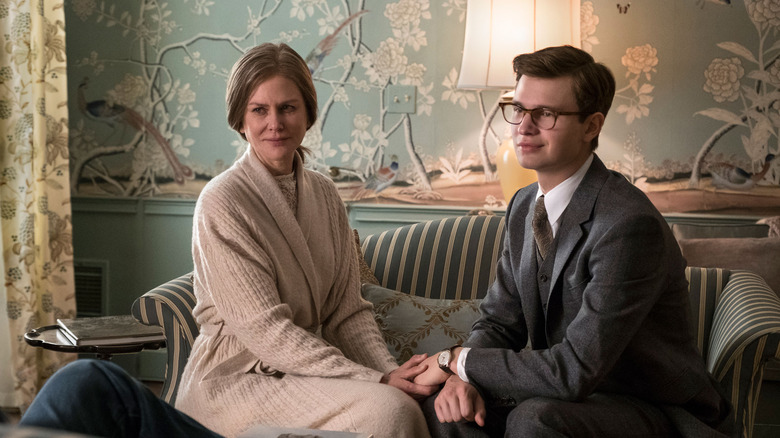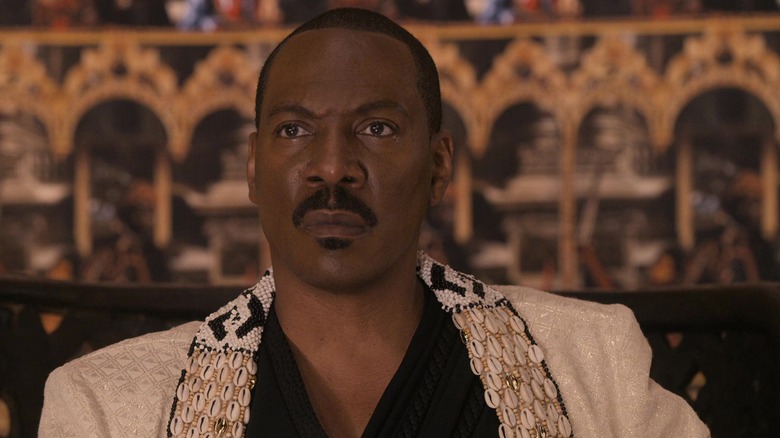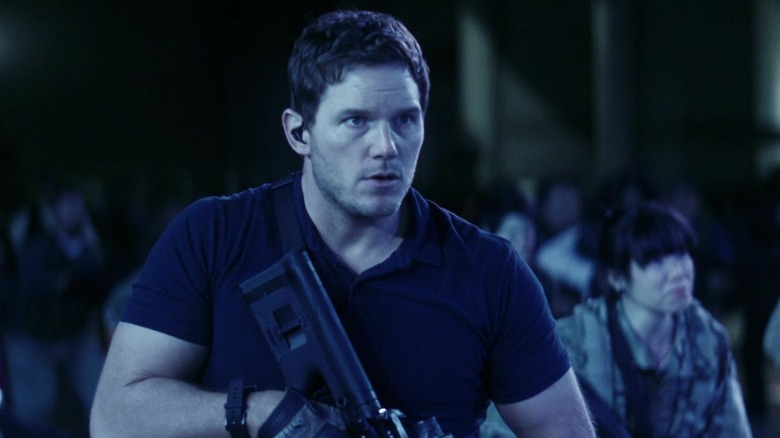The Untold Truth Of Amazon Studios
Among streaming movie studios, there's no question the best-known member of this class is Netflix. But don't discount Amazon Studios, which, like Netflix, began releasing original feature-length productions in 2015.
Starting with the film "Chi-Raq," Amazon Studios has proceeded to be the home for a wide variety of fare ranging from Oscar-friendly titles like "Manchester by the Sea" to mainstream projects like "Borat Subsequent Moviefilm." The vast majority of individuals have doubtlessly watched at least one title from their dense library, which only aims to grow larger in the years to come. While features like "The Tomorrow War" might be familiar to the broader public, many aspects of Amazon Studios remain far less known even to film buffs.
Details of this company, like it's original attempt at getting into the movie studio game or its highest-grossing films at the worldwide box office, among many other factors, reflect the true reality of one of the biggest players in the streaming cinema landscape. With streaming-based companies like Amazon Studios increasing their presence in the modern cinema landscape every day, now is the perfect time to explore the untold truth of Amazon Studios.
Amazon's first unmade attempt at an original movie
While Amazon Studios wouldn't release an original movie until December 2015 with the Spike Lee film "Chi-Raq," the prospect of Amazon engaging with the world of original cinema dates back almost a decade prior. In 2006, before even Netflix streaming had become a staple of mainstream culture, the Los Angeles Times reported that Amazon Inc. picked up the film rights to the book "The Stolen Child."
When announcing this deal, Amazon claimed that it could use its famous brand name to immediately become a major presence in the world of cinema. Two years later, the company's pursuit of immediate Hollywood notoriety was reinforced when Amazon partnered up with 20th Century Fox to produce this adaptation, per MovieWeb. Not only was Amazon looking to become a big player in movies, but it was now working with one of the biggest movie studios in history.
In hindsight, it's worth noting that Amazon's pick of "The Stolen Child" was no coincidence. Film adaptations of fantasy novels were at an all-time peak of popularity at movie theaters thanks to "The Lord of the Rings" movies in the early 2000s. No wonder Amazon saw "The Stolen Child" as an easy way to gain a foothold in theatrical cinema. The lack of any streaming platform, or even the concept of that being an option, further demonstrates how this early unmade foray into original movies differs significantly from what Amazon Studios would become.
The initial plan for original movies
At the dawn of 2015, the long-rumored development of Amazon getting into the original film business came to pass. Variety reported that Ted Hope had been appointed the leader of a division dedicated to making original Amazon movies, and his prior experience in film distribution made it clear what kind of movies Amazon was hoping to make. Having primarily dabbled in international and arthouse cinema, Hope would now be overseeing a slate of original features made in the $5 to $25 million budget range for the nascent film studio, with the outfit set to produce around a dozen original projects a year.
The message here was clear — Amazon was not in the business of producing the next "Guardians of the Galaxy." Its focus would be delivering arthouse titles, a sentiment reinforced in comments shared by The Hollywood Reporter from Amazon Studios Vice-President Roy Price, who said that this new company could "also benefit filmmakers, who too often struggle to mount fresh and daring stories that deserve an audience." In an interview with CNN just a few weeks after this announcement, Price talked about how the presence of Amazon Studios made him "hopeful about the next 10 years in independent film," reaffirming the kind of movies Amazon would be making.
This approach is a stark contrast to the modern of Amazon Studios, which still releases artsy fare like "A Hero," but primarily focuses on premiering more mainstream-friendly projects like "Cinderella" and "Hotel Transylvania: Transformania."
Amazon made Oscar history with Manchester by the Sea
Considering that Netflix earned over 30 nominations at the 93rd Academy Awards, it can be hard to remember that streaming films had basically no presence at the Oscars as late as 2015. However, the award season landscape changed dramatically in a short period, with Amazon Studios leading the way in terms of solidifying an air of prestige around streaming projects. Just a little over a year into its forays into original feature films, Amazon Studios scored a historic best picture nomination for its 2016 movie "Manchester by the Sea."
Not only did this serve as the first-ever Amazon Studios release to get the best picture nod, but Variety notes that it was the first movie from a streaming service to get recognized in the most prestigious Oscars category. This meant that Amazon beat Netflix in having a presence in this category by a whopping two years.
In the years since, Amazon Studios has been less successful in producing best picture contenders, with only one other title from the company, "Sound of Metal," making it into the category. However, the groundbreaking nature of "Manchester by the Sea" appearing in the best picture roster ensures that Amazon Studios will always have a place in the history of this awards show.
What are the highest-grossing Amazon Studios movies?
While Netflix doesn't disclose theatrical box office for the big-screen runs of its features, Amazon Studios, before the COVID-19 pandemic, was always good about keeping the public in the loop on how its films performed at the box office. It was part of the company's bid to fit into the mold of a traditional film studio, complete with open knowledge on which projects registered as box office duds and which ones soared to the top.
In its history, Amazon Studios only had five movies crack $10 million at the domestic box office, according to The Numbers. However, two of those managed to break out and become crossover hits, including the company's biggest film ever, "Manchester by the Sea." Grossing $47.6 million in North America alone, "Manchester by the Sea" served as an early demonstration that Amazon could launch major hits on the big screen. Seven months after that Kenneth Lonergan directorial effort, "The Big Sick" emerged as the second-biggest Amazon Studios release ever with a $42.8 million domestic total.
While those two projects proved extremely fruitful for Amazon Studios, it wasn't all roses for this studio in the theatrical exhibition space. Other projects, like "Wonder Wheel" and "Suspiria," failed to recoup their budgets. At least this studio produced a handful of moneymakers through unorthodox titles.
Amazon Studios as a self-distributor
For its first two years of existence, Amazon Studios was content to have other film studios distribute its wares theatrically, as noted by Variety. This provided a bridge, of sorts, between the old and new ways of releasing motion pictures, with studios like Roadside Attractions and Lionsgate distributing titles such as "Manchester by the Sea" in theaters before Amazon Studios put them on its streaming service. Among the many other benefits of this sort of arrangement, it allowed Amazon to develop good relationships with traditional Hollywood studios and movie theaters while still producing exclusive projects for its streaming service.
However, by the end of 2017, Amazon Studios was looking to have more autonomy over its theatrical cinema presence. It was time for Amazon to become a distributor itself. These plans were cemented in late 2017, when the worldwide head of Amazon Studios, Jason Ropell, explained to Variety that the shift was to allow Amazon to have full control over its titles while also ensuring its projects would receive traditional big-screen releases before heading onto streaming.
Amazon Studios would kick off its life as a theatrical distributor with "Wonder Wheel" in December 2017, though it would find significantly less box office success in this stage of its existence. After this point, only one feature from Amazon Studios, the comedy "Late Night," would crack $20 million at the worldwide box office. Perhaps Amazon should've taken an "if it ain't broke" approach to its distribution plans.
Amazon's record-breaking Sundance purchases
Over time, one of the defining traits of Amazon Studios has been its penchant for ponying up big bucks at the Sundance Film Festival to purchase buzzy titles. This trend dates back to 2016 when The Hollywood Reporter revealed that Amazon had plunked down $10 million to pick up "Manchester by the Sea." The following year, Deadline reported that Amazon returned to the prestigious film festival and ponied up $12 million to secure the distribution rights to "The Big Sick." Through these two purchases alone, it was clear Amazon wasn't messing around and was willing to outspend more experienced studios to ensure it had ownership of some of the most desired titles at Sundance.
Amazon Studios has continued to throw money around freely at Sundance darlings in the years since. This was especially true in 2019, when IndieWire observed that the company spent $41 million to acquire a variety of titles, including "Late Night," "The Report," and "Honey Boy." It was a costly maneuver, especially since not all the films met box office expectations. Still, Amazon Studios head Jennifer Salke expressed nothing but pride to Deadline for the spending spree. This explains why the studio has continued to spend big chunks of change at the festival for titles like "Herself."
Through these purchases, the modern version of the Sundance Film Festival has become synonymous with Amazon Studios engaging in major acquisitions.
When did Amazon shift from theatrical releases to streaming exclusives?
For roughly four years, Amazon Studios primarily focused on rolling out its films in major theatrical releases before bringing them to its streaming service. Whereas Netflix only gives its titles tiny theatrical releases in a handful of theaters, an Amazon Studios release could wind up playing in over 2,200 locations across North America. However, The Hollywood Reporter noted that challenges in self-distributing titles like "Life Itself" and "Late Night" began to change Amazon's tune. By the end of 2019, a new release strategy would emerge.
The Adam Driver vehicle "The Report" was one of the earliest instances of a major Amazon Studios release going the Netflix route of only debuting in a handful of theaters before appearing on its streaming service two weeks later, per Deadline. That same year, Deadline also reported that "The Aeronauts" eschewed a planned IMAX theatrical launch in favor of going directly to Amazon subscribers. The closure of theaters in the wake of the COVID-19 pandemic only reaffirmed Amazon's new fondness for non-theatrical releases, and it sent major titles like "The Tomorrow War" to its platform without even attempting a big-screen release. Even once global movie theaters were back up and running, projects like "Being the Ricardos" only got 10 days of theatrical play before bowing in people's homes.
Like any movie studio, Amazon Studios has evolved, with its evolution being especially apparent in its shift from traditional theatrical releases to making streaming premiers a priority.
How Amazon came to release Borat Subsequent Moviefilm
At the end of 2020, Amazon Studios scored its first major streaming-exclusive hit with "Borat Subsequent Moviefilm." The project was an even greater departure for the studio in terms of it being a franchise picture, a far cry from the works of Lynne Ramsay and Pawel Pawlikowski that Amazon had been most famous for releasing up to that point. Given what an outlier yet also a stunning success "Borat Subsequent Moviefilm" turned into for Amazon Studios, it has to be asked — how did they land this picture?
Like so many movies in 2020, "Borat Subsequent Moviefilm" was initially set to be released theatrically through Universal Pictures, as reported by Deadline. However, the continued effects of COVID-19 on movie theaters made that release impossible, so the producers of "Borat" scouted out streaming services that could serve as a new home for the film. This is where Amazon Studios came into play, with the streamer reportedly paying around $80 million to acquire the big comedy. It was a significant move for Amazon, which had never hosted this kind of mainstream comedy on its service before. However, the result was that "Borat Subsequent Moviefilm" became a smash hit that generated all kinds of talk and even multiple Oscar nominations.
Amazon and Blumhouse's production deal
Jason Blum's Blumhouse Productions is best-known for its long-term contract with Universal Pictures, which has resulted in a slew of spine-tingling movies like "Get Out," "The Purge," and "Happy Death Day." However, Blumhouse has managed to have a presence across Hollywood and has worked with several different studios. This even includes Amazon Studios, with Deadline reporting that the duo made a pact that entailed Blumhouse creating eight original features for Amazon's streaming service.
At the time, there were no details on what these features would look like or what stories they'd tackle. Eventually, these eight projects were released in two chunks as "Welcome to the Blumhouse" collections, each comprised of four original motion pictures. Some of these were brand-new movies created exclusively for the deal. Others were projects like Veena Sud's "The Lie," which premiered at the Toronto Film Festival before the Amazon/Blumhouse deal was even announced.
Debuting in October 2020 and 2021, it's unknown if "Welcome to the Blumhouse" provided ample amounts of viewership for Amazon's streaming service or if there will be further collaborations between Blumhouse and Amazon. Even if there aren't, at least the mere existence of these projects allowed Blumhouse to stretch its wings and further expand its presence in the pop culture landscape.
How much did Amazon Studios lose on The Goldfinch?
For the most part, Amazon Studios has primarily focused on financing its in-house productions. That said, throughout the years the studio has occasionally opted to partner with other companies to get certain projects going. Sometimes this means acquiring finished films during post-production, such as on "Borat Subsequent Moviefilm," and other times it means partnering up with another studio from the get-go. The latter scenario was the plan for "The Goldfinch," a 2019 drama adapted from a novel of the same name that Amazon Studios partnered up with Warner Bros. to make.
This union meant that one of the oldest traditional theatrical movie studios would be uniting forces with a newer streaming service, a fascinating combination of distributors. Unfortunately, a conceptually intriguing studio partnership did not lure audiences to see "The Goldfinch" in theaters. A tremendous box office dud, it was reported that "The Goldfinch" would be a money drain for all its financiers, including Amazon. The Hollywood Reporter revealed that the studio would lose the entire $16 to 18 million it had ponied up for "The Goldfinch." Though lower than the losses for Warner Bros., it was still a crushing outcome for a rare collaboration between Amazon and other traditional studios.
Amazon Studios shifting to mainstream fare
Initially, the model for Amazon Studios focused on movies that cost between $5 and $25 million, reflecting an emphasis on indie cinema. Once seen as a creator of projects that could counter a franchise-centric cinema landscape, Amazon Studios has started becoming a regular home for blockbusters.
During the COVID-19 pandemic, Amazon Studios began to adjust course and spend big money for tentpole titles like "The Tomorrow War" and "Coming 2 America." It was a confluence of perfect events for the streamer, as studios needed a home for fare it didn't feel comfortable launching into theaters during the pandemic while Amazon wanted more mainstream-friendly projects to pack it streaming library with.
This development isn't just limited to securing projects made by other studios, as a profile in The New York Times with Amazon Studios head Jennifer Salke revealed. Not only did she discuss that Amazon was intentionally shifting its focus towards more mainstream-friendly projects, but Salke expressed ambitions of Amazon producing its own projects that could serve as the next "Borat Subsequent Moviefilm" for the streamer.
This plan appears to be underway now that Variety has revealed that Eddie Murphy has agreed to make multiple comedies for Amazon and Deadline let slip that Dwayne Johnson's "Red One" is also set up at the streamer. Though a drastically different approach from its starting goals, it's hard to argue with Amazon Studios making these tweaks given the success of productions like "Coming 2 America."
The appeal of releasing a movie through Amazon Studios
For modern filmmakers, it's no longer just a choice of whether you want your film released in theaters or on streaming. With so many streamers producing original films, you also have to choose what streamer suits your motion picture. That can be a daunting choice on paper, but for some directors, there's no question that Amazon Studios is an ideal home for a feature. This includes Chris McKay, the helmer of "The Tomorrow War," a Chris Pratt star vehicle initially set to hit theaters through Paramount Pictures, per Deadline.
However, the pandemic sent "The Tomorrow War" to Amazon Studios, a platform that McKay ended up embracing fully. In exploring why Amazon Studios worked as a place to release "The Tomorrow War," McKay observed to Variety how "you want as a filmmaker ... to have a dialogue with as many people as humanly possible. So to have a movie that comes out to 240 countries day in date, to be able to have that kind of dialogue with the world, that's really exciting." McKay also observed that the presentation of this sci-fi blockbuster on Amazon's streaming service was the "closest I'll ever have to a guarantee that people will see what we did with the color correction and the visual effects. So those things are exciting."
With these advantages, it becomes clearer why Amazon can be a mighty welcoming home for movies in a marketplace chock full of streaming options.
